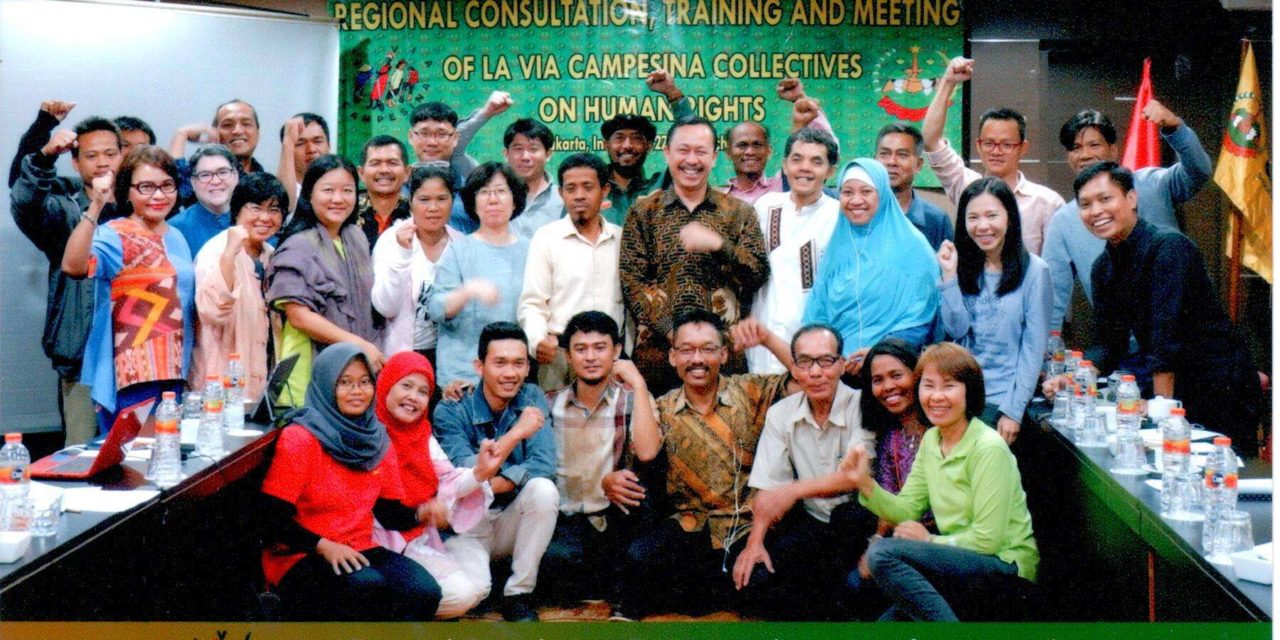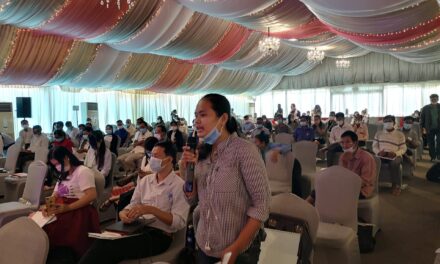by Joseph Purugganan
Jakarta, Indonesia–Peasants, family farmers, indigenous peoples and support groups came together in Jakarta from 27-29 March 2018 for a three-day Regional Consultation, Training, and Meeting of La Via Campesina Collective on Human Rights.
“We are here from Southeast Asia, and East Asia to help strengthen our movements to support our campaign” said Henry Saragih General Secretary of Serikat Petani Indonesia in his remarks to open the meeting. “ This draft declaration is as much a product of research and grassroots struggles” added Saragih.
From Grassroots to Geneva
Saragih traced back the history of the campaign for a United Nations Declaration on the Rights of Peasants from 2001– when the initial idea for at that time an international convention on the rights of peasant’s–was first proposed, to the initial efforts and consultations to develop the text of the declaration which culminated in the Regional Conference on Peasant’s Rights in April 2002. The campaign shifted to Geneva beginning in 2002 as the effort was directed towards the adoption of a declaration at the UN Human Rights Council. According to Saragih, there have been a number of key moments that have pushed the momentum forward. The food crisis in 2008 provided a big impetus, according to Saragih with the campaign using it as an opportunity to highlight the issues faced by peasants resulting from the non-fulfillment of their rights. In 2009, La Via Campesina was invited to the High-Level Meeting on World Hunger in New York where it again pushed the idea for a UN declaration. A major breakthrough came in September 2012 with the adoption of a UNHRC Resolution 21/19 on the promotion and protection of human rights of peasants and other people working in rural areas. The resolution put forward by Bolivia, Ecuador, Cuba and South Africa provided the mandate for the creation of an open ended inter-governmental working group (OEIGWG) to develop and adopt the declaration. Another resolution was adopted in 2014 (26/26) which renewed the mandate of the working group to prepare a new text for presentation at the second session of the OEIGWG.
Gaining broad support
The campaign has been gaining broad support over the years. In Indonesia, institutions like the National Human Rights Commission have helped to push the initiative forward. CHR chairperson Ahmad Taufan Damanik who spoke at the meeting, highlighted the importance of the initiative in the wake of what he called the “prolonged agrarian problem” in Indonesia.
In a video message, the Permanent Mission of the Plurinational State of Bolivia to the United Nations Office in Geneva, called on La Via Campesina and its allies to “intensify the valuable efforts that you are making in order to convince your governments to support the Declaration.”
Focus on the Global South for its part expressed its solidarity and commitment to the campaign as well, and linked it to the current campaigns and struggles against new generation free trade and investment agreements as well as the global effort for a legally-binding instrument at the UN on human rights obligations of TNCs.
Country Context
In preparation for the fifth session of the Open Ended Intergovernmental Working Group (OEIGWG) which will be held from 9-13 April in Geneva, the participants engaged in discussions on current state of peasants rights violations across the region, and to fine tune concrete proposals to the draft declaration. Among the more critical issues discussed included the debate over State subsidies to agriculture and whether these should be viewed in light of negative experiences of farmers unable to compete with highly subsidized imports; issues around seeds, plant variety protection, and farmers rights; the rights of women farmers and rural women.
Additional insights were also drawn from country-level inputs.
Paitoon Soisod of the Assembly of the Poor Thailand raised concerns over the criminalization of farmers struggling against Special Economic Zones (SEZs),and the continued conversion of agricultural lands to industrial use.
Ritchel Tamayo of Paragos Pilipinas from the Philippines highlighted the continuing struggle of farmers for agrarian reform and access to agrarian justice particularly for women farmers.
Shushi Okazaki of Nouminren talked about existing policies in Japan that support family farming-the Agriculture Land Act, the Main Crops Seeds Act, Agricultural Cooperative Act, and the price support system- that they use as entry points to push the government to supporting the Declaration. Similarly, Moojin Lee of Korea Peasant League shared on the ‘absolute land’ concept in Korean Law where only farmers are allowed to own and use agricultural lands. According to Lee however, this concept in the law has been saddled with so many exemptions and loopholes. Lee also briefly discussed the idea of ‘public commons’, as an approach to advance the public interest embedded in public lands.
Speaking as well on the national agriculture and land law, Socheat Heng representing the Cross-Sectoral Network in Cambodia shared the history of their network and their continuing campaign against the proposed changes to the law as part of a long-drawn struggle against land grabbing and marginalization of peasants in Cambodia.
A Women’s Caucus was held where the participants ironed out concrete recommendations on how to improve among others the Article 4 on Rights of peasant women and other women working in rural areas.
Moving Forward
A number of key strategies were put forward ahead of the crucial 5th session in Geneva. These include (1) Consolidation of support of governments that supported the resolution. The campaign hopes to send letters to the different missions in Geneva in time for three key moments- the working group session in April, the procedural discussion in June, and the omnibus vote on the resolution in September; (2) Sending letters to key regional blocs like ASEAN, SARC, non-aligned movement, among others, (3) organizing events and mobilizations on Peasants Rights in key political moments like the WB meeting in Bali In October, the ASEAN Peoples Forum in Singapore, and the Human Rights Day in December.




![[IN PHOTOS] In Defense of Human Rights and Dignity Movement (iDEFEND) Mobilization on the fourth State of the Nation Address (SONA) of Ferdinand Marcos, Jr.](https://focusweb.org/wp-content/uploads/2025/07/1-150x150.jpg)



